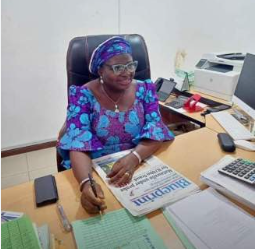By Ajibola Olaide, JKNewsMedia Reporter
IN A few days, precisely on March 7, Dr. Mrs. Oluwatoyin Madein will conclude her tenure as the first female Accountant-General of the Federation.
A woman of quiet strength, she held her ground in an office long dominated by men, leading with integrity and without controversy.
Under her leadership, Nigeria’s financial management landscape underwent significant transformation.
With a public service career spanning over three decades, her tenure was marked by key reforms, transparency, and a commitment to accountability.
Her journey began over 32 years ago in the civil service, where she quickly distinguished herself through innovation and dedication.
On 18th May 2023, she was appointed as the Accountant-General of the Federation, a role in which she implemented major reforms that redefined public finance management in Nigeria.
Through her leadership, transparency in government spending improved significantly.
She championed the policy of publishing Federation Accounts Allocation Committee (FAAC) revenue distributions, ensuring Nigerians had access to crucial financial information.
This initiative enhanced public trust and accountability in government revenue management.

A strong advocate for capacity development, Madein introduced training programmes to equip civil servants with modern financial management skills.
She upgraded the Federal Treasury Academy in Orozo, Abuja, into a premier institution for public finance training, strengthening Nigeria’s workforce in global financial best practices.
Her tenure also saw the effective implementation of the Integrated Personnel Payroll Information System (IPPIS), eliminating ghost workers and curbing fraudulent salary payments.
Through strategic engagement with stakeholders, she resolved longstanding crises within the system, ensuring seamless salary payments across the federal civil service, security services, and tertiary institutions.
In her pursuit of efficiency, Madein spearheaded the Public Finance Management (PFM) Reform initiative, leading to the repeal of outdated financial laws.
This reform modernised Nigeria’s financial governance, aligning it with international standards and ensuring better fiscal discipline.
Beyond financial reforms, she established staff cooperative societies in Ministries, Departments, and Agencies (MDAs) to provide low-interest financial aid to civil servants.
These cooperatives not only offered credit facilities but also generated shared profits, improving staff welfare.
Her legacy includes the successful implementation of the Treasury Single Account (TSA), Government Integrated Financial Management Information System (GIFMIS), and International Public Sector Accounting Standards (IPSAS).
These reforms strengthened financial oversight, reduced leakages, and enhanced efficiency in public fund management.
Madein’s impact was not confined to policies alone.

She set up an e-library in the Office of the Accountant-General of the Federation (OAGF), providing research and reference materials to support effective financial management.
Under her leadership, Nigeria’s revenue generation and management reached new heights.
By implementing a cashless revenue collection system, she tackled corruption, eliminated loopholes, and ensured timely fund disbursement to MDAs and government tiers.
Workers in her ministry said her departure from office marks the end of a transformative era in Nigeria’s financial sector.
However, they admitted that her contributions will continue to shape the country’s fiscal policies and governance for years to come in the hopes that whoever succeeds her will keep up with some of her policies.





